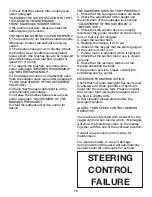
4
GENERAL RULES OF SAFETY
- The rules below have to be followed carefully in order
to avoid injury to the operator and damage to the
machine.
- Read the labels carefully on the machine. Do not cover
them for any reason and replace them immediately if
damaged.
-
ATTENTION
: The machine must be used exclusively by
authorized staff that have been instructed on its correct
and proper use.
-
ATTENTION
: Do not use the machine on areas having a
higher gradient than the one stated on the number plate.
-
ATTENTION:
The machine is not to be used by
persons, children included, with reduced physical,
sensorial or mental capabilities, or with lack of
experience or knowledge, unless they could benefit,
through the intermediation of a responsible person for
their safety, by a supervision or instructions concerning
to its use.
- During the operation of the machine, pay attention to
other people and especially to the children.
- Children shall not play with the machine.
- Children cannot carry out cleaning and maintenance of
the machine.
TRANSFER
- Do not strike shelvings or scaffoldings where there is
danger of falling objects.
- Leaving the machine in parking position, take off the
key.
- Do not use the machine as a means of transport.
- Adapt the working speed to the adhesion conditions:
particularly, slow down before narrow curves have to be
faced.
STORAGE AND DISPOSAL
- Storage temperature: between 32°F and 131°F (0°C and
+55°C).
- Perfect operating temperature: between 0°C and +40°C
(32°F and 104°F).
- The humidity should not exceed 95%.
- Provide for the scrapping of the material of normal
wear following strictly the respective rules.
- The batteries need to removed from the machine
before its scrapping.
- When your machine has to stop activity, provide
for the appropriate waste disposal of its materials,
especially oils, batteries and electronic components, and
considering that the machine itself has been, where
possible, constructed using recyclable materials.
CORRECT USE
- Do not use the machine on surfaces covered with
inflammable liquids or dusts (for example hydrocarbons,
ashes or soot).
- In case of fire, use a powder based fire-extinguisher.
Do not use water.
- Do not use the machine in explosive atmosphere.
- The machine has to carry out simultaneously the
operations of washing and drying. Different operations
must be carried out in restricted areas prohibited to
non-authorized personnel and the operator has to wear
suitable shoes.
- Signal the areas of moist floors with suitable signs.
- Do not mix different detergents, avoiding harmful
odors.
- Avoid brushes operation when the machine is standing
still in order to prevent floor damages.
MAINTENANCE
- If the machine does not work properly, check by
conducting simple maintenance procedures. Otherwise,
as for technical advice from an authorized service center.
- For any cleaning and/or maintenance operation take off
the power supply from the machine.
- Where parts are required, ask for ORIGINAL spare parts
from the distributor and/or from an authorized dealer.
- Use only ORIGINAL brushes indicated in the paragraph
“RECOMMENDED BRUSHES”.
- Do not take off the protections which require the use of
tools for their removal.
- Do not wash the machine with direct water jets or with
high water pressure nor with corrosive material.
- Every 200 working hours have a machine check by an
authorized service center.
- Before using the machine, check that all panels and
coverings are in their position as indicated in this use
and maintenance catalogue.
- Restore all electrical connections after any
maintenance operation.
TRANSPORTING THE MACHINE
WARNING
: Before transporting the machine on an open
truck or trailer, make sure that:
All tanks are empty.
Recovery tank cover is latched securely.
The machine is tied down securely.
The machine’s electromagnetic brake is engaged (not
manually overridden).
GENERAL RULES OF THE BATTERIES
- At any intervention on the batteries, use suitable acid-
proof gloves and glasses.
- Do not smoke near the batteries and do not approach
them with free flames.
- Check that a fire-extinguisher is available on site.
- Be very careful in case of leakages or liquid outlets
because corrosive.
- Do not place any metallic tools onto the batteries. Risk
of short circuit!
- It is compulsory to hand over exhaust batteries,
classified as dangerous waste, to an authorized
institution according to the current laws.
Содержание BDSO 20/21
Страница 21: ...21 TS120 S59 U...
































